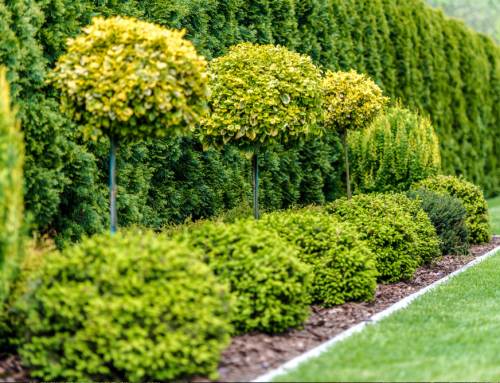Why Eco-Friendly Landscaping Matters for Manchester Organisations
Across Manchester, facilities managers in offices, schools, and sports clubs face two ongoing challenges: controlling maintenance costs and demonstrating environmental responsibility. With rising energy prices and growing pressure to adopt greener practices, eco-friendly landscaping has become more than a trend- it’s a smart investment.
The good news is that sustainable landscaping doesn’t mean overspending. By making simple, strategic choices, organisations can reduce costs while creating attractive, functional, and environmentally responsible outdoor spaces.
What Is Sustainable Landscaping?
Sustainable landscaping (also called eco-friendly grounds maintenance) involves designing and maintaining green spaces in ways that reduce resource use and environmental impact. It’s about working with nature, not against it. This approach typically includes:
-
Using native and climate-appropriate plants that require less water and care
-
Reducing reliance on chemicals through natural pest control and soil health
-
Implementing water-saving techniques, such as rainwater harvesting and smart irrigation
-
Recycling green waste, like grass clippings and leaves, back into the landscape
-
Encouraging biodiversity, such as planting for pollinators and wildlife
For Manchester organisations, this approach aligns with both sustainability targets and financial efficiency.
Cost-Saving Benefits of Eco-Friendly Grounds Maintenance
Facilities managers are often surprised to find that sustainable practices can actually lower long-term costs. Here’s how:
1. Lower Water Bills
Traditional landscaping often relies on thirsty lawns and frequent watering. By incorporating drought-tolerant plants and efficient irrigation systems, you can cut water use significantly. Rainwater harvesting tanks are another budget-friendly way to make the most of Manchester’s frequent rainfall.
2. Reduced Chemical Spend
Switching to organic fertilisers and natural pest management reduces chemical costs while also creating healthier soil and plants. Over time, this leads to stronger, more resilient landscapes that require fewer treatments.
3. Less Frequent Maintenance
Native plants and sustainable planting schemes are better adapted to local conditions. They typically require less mowing, pruning, and replacement—saving time and labour.
4. Improved Reputation and Compliance
More organisations are being measured against their sustainability goals. Schools and clubs in Manchester can also attract funding or grants for green initiatives. Showing commitment to green landscaping Manchester is a reputational advantage that may open doors to new opportunities.
Practical Eco-Friendly Landscaping Ideas for Manchester
Here are some cost-effective strategies that offices, schools, and clubs in Greater Manchester can put into action:
Choose Native and Low-Maintenance Plants
Opt for species that thrive naturally in the North West climate. Plants like lavender, wildflowers, and hardy shrubs need minimal care and support pollinators. This reduces water and fertiliser requirements.
Embrace Green Lawns Alternatives
Instead of high-maintenance grass, consider wildflower meadows, clover lawns, or mixed planting. These create attractive spaces while lowering mowing frequency and costs.
Install Smart Irrigation
Drip irrigation and rain sensors ensure water is only used when necessary. Coupled with rainwater harvesting, this can dramatically reduce utility bills.
Compost Green Waste
Turning leaves and clippings into compost reduces waste disposal costs and creates a free, nutrient-rich soil conditioner for your grounds.
Create Biodiversity Zones
Designating small areas for pollinator-friendly flowers or wildlife habitats boosts biodiversity, requires little upkeep, and supports Manchester’s local ecosystem.
How Facilities Managers Can Get Started
Implementing eco-friendly grounds maintenance doesn’t have to be overwhelming. A step-by-step approach works best:
-
Assess your current grounds – Identify areas where water, chemicals, or maintenance time are being wasted.
-
Set clear sustainability goals – Whether it’s reducing water use by 20% or cutting mowing frequency, measurable goals keep projects on track.
-
Prioritise quick wins – Start with simple changes like composting or switching a section of lawn to wildflowers.
-
Work with a specialist – A professional green landscaping company in Manchester can recommend tailored solutions that fit your budget.
-
Review and adjust annually – Sustainable landscaping evolves over time. Regular reviews ensure your grounds remain cost-effective and eco-friendly.
Why Choose Local Expertise in Manchester
Partnering with a local eco-friendly grounds maintenance provider ensures your landscaping strategy is suited to Manchester’s unique climate and conditions. Local experts understand seasonal challenges, soil types, and the specific needs of community spaces like schools and sports clubs.
Greener Grounds, Smarter Budgets
Sustainable landscaping is not just good for the planet—it makes financial sense for facilities managers in Manchester. By choosing native plants, saving water, reducing chemical use, and investing in smart maintenance practices, organisations can achieve greener, healthier landscapes without overspending.
For offices, schools, and clubs, eco-friendly grounds maintenance is a win-win: a more attractive, environmentally responsible outdoor space that saves money in the long run.






